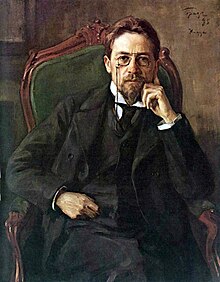Anton Chekov
Anton Pavlovich Chekhov (1860-1904) was a Russian writer now internationally famous for his plays and short stories, partly thanks to the translations of his work by Constance Garnett into English.[1]

As a playwright, he is considered a key representative of early modernism. His plays The Seagull, Uncle Vanya, Three Sisters, and The Cherry Orchard, for example, are said to "present a challenge to the acting ensemble as well as to audiences, because in place of conventional action Chekhov offers a 'theatre of mood' and a 'submerged life in the text'."[2]
While studying for his medical degree, Chekov began to author comedic sketches of Russian life for humorous journals to support himself and his family. The publication of the autobiographical story "The Steppe" (1888), marked his move to more serious subjects and tales,[2] among them “Neighbors” and “Ward Number Six” (1892), “An Anonymous Story” (1893), “The Black Monk” (1894), “The Murder" and “Ariadne” (1895), “Peasants” (1897), the trilogy “The Man in a Case,” “Gooseberries,” and “About Love” (1898) and "The Lady with the Dog" (1899), all of which helped build his reputation as the "master of the modern short story."[1]
See links to the full text of these and other short stories under "Further reading" below.
References
edit- ↑ a b Hingley, Ronald Francis. "Anton Chekhov." Encyclopedia Britannica, 25 Jan. 2021, https://www.britannica.com/biography/Anton-Chekhov.
- ↑ a b Wikipedia contributors. "Anton Chekhov." Wikipedia, The Free Encyclopedia.